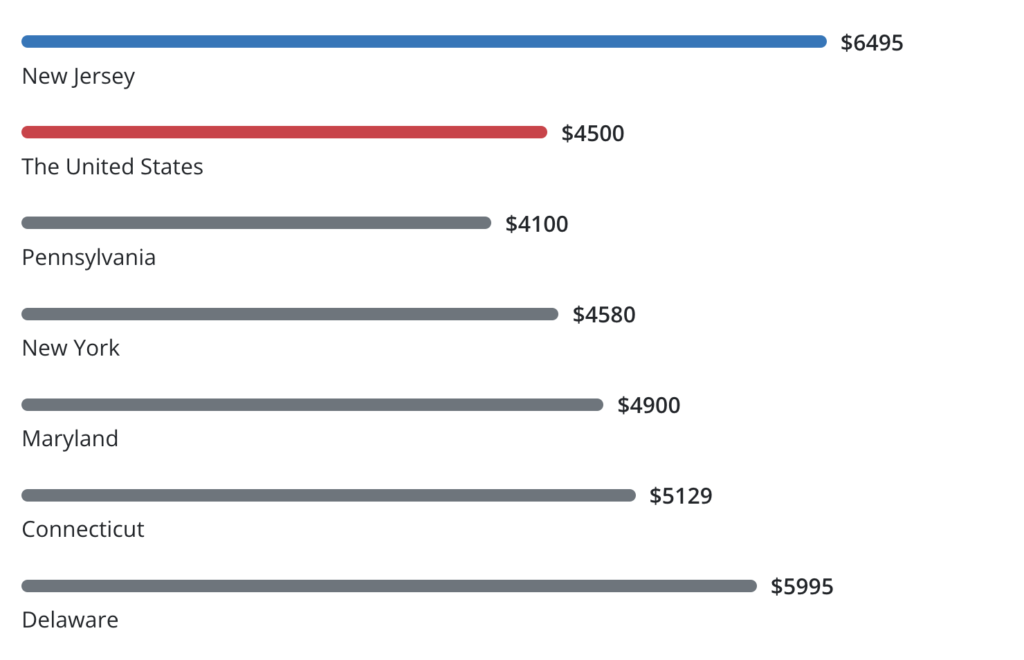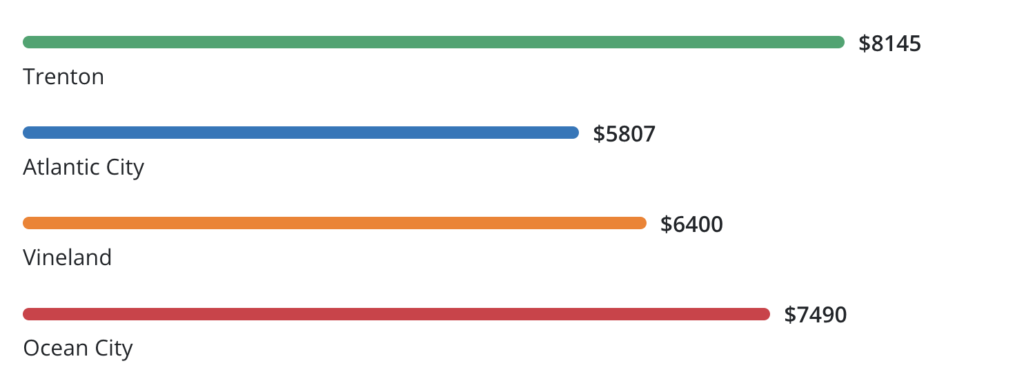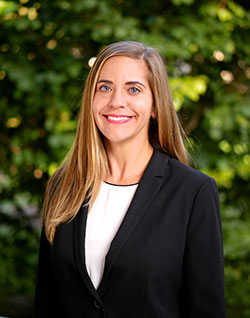Original article published on Caring.com
A visit to New Jersey highlights why many of the Garden State’s almost 9.3 million residents are seniors. You’ll see sprawling farmland, beautiful and charming towns and over 130 miles of pristine coastline peppered with boardwalks. New Jersey also boasts many fine hospitals. Morristown Medical Center ranks in the national top 50 for cardiology and heart surgery and Hackensack University Medical Center is in the top 50 for neurology and neurosurgery.
New Jersey is among the highest-placed states in the 2022 Senior Living Report. Some variables reduce its score, such as fewer mental health professionals than average and limited opportunities to participate in civic life. However, these are offset by many others, including the diversity of destinations to visit and an above-average number of primary care physicians. Assisted living costs average $6,495 per month, which is high compared to the national median but in line with the above-average cost of living throughout the Northeast.
This guide considers assisted living fees across New Jersey and neighboring states, as well as the costs of other types of care. It also lists some senior-friendly resources and legal information concerning assisted living facilities.
The Cost of Assisted Living in New Jersey
Although every assisted living facility has a unique pricing structure, you may want to budget for around $6,495 per month, which is the average fee for New Jersey published in the 2021 Genworth Cost of Care Survey. This is above the norm for the country, where seniors are likely to pay around $4,500. It’s also high compared to the median fees for the surrounding states. Delaware’s fees of $5,995 come closest, followed by Connecticut, at $5,129, and Maryland, at $4,900. New York and Pennsylvania have the most affordable average fees, at $4,580 and $4,100, respectively.
Assisted living fees vary greatly across New Jersey. Seniors living in and around Atlantic City usually pay about $5,807 per month for their residential care, while further down the coast, in Ocean City, they can pay an additional $1,683 for similar services. The average fees of inland cities are equally variable, such as Vineland, where costs are typically $6,400, and Trenton, where seniors pay around $8,145 — which are the highest fees in the state.
When appraising the average monthly fees for senior care, it’s prudent to consider other costs that may need to be included. For example, New jersey’s assisted living facilities provide accommodation and care for approximately $6,495 per month, but some other care types still require seniors to pay for their home’s maintenance in addition to their care. Consequently, the average fees charged by homemaker agencies ($5,529), home health aides ($5,710) and adult day centers ($1,950) don’t look as affordable on closer inspection. Nursing homes also provide accommodation and care, but their typical rates are significantly more expensive, with a semiprivate room averaging $11,254 and a private one costing another $897 per month.
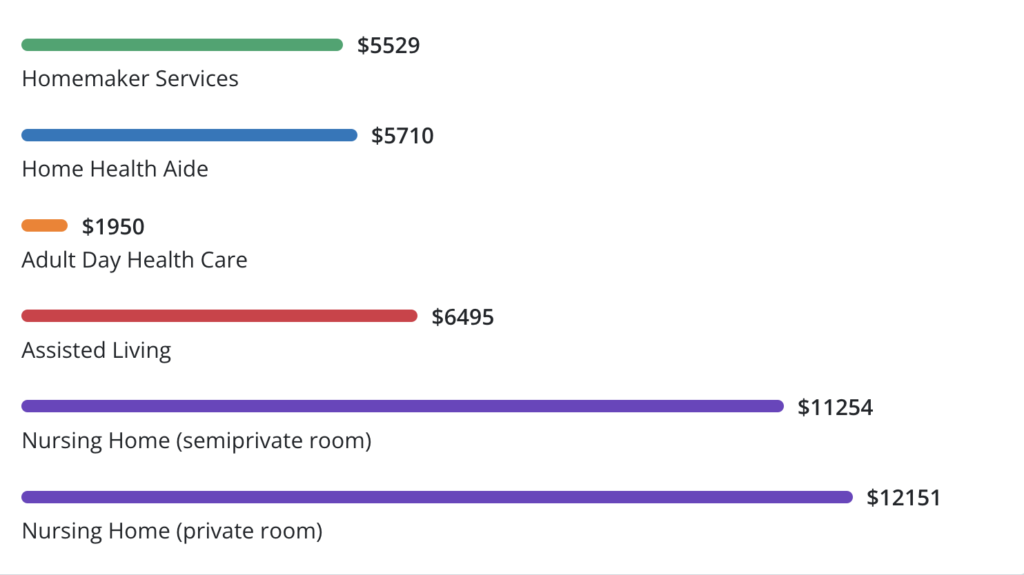
Does Medicaid Cover Assisted Living in New Jersey?
New Jersey’s Medicaid program is called NJ FamilyCare and it can pay for assisted living. It can cover some or all expenses for eligible seniors, giving them access to high-quality care they would otherwise be unable to afford. The Managed Long-Term Care Services and Supports (MLTSS) program can help low-income seniors receive care in licensed facilities certified by the Department of Human Services.
What Assisted Living Services Are Covered by Medicaid in New Jersey?
The help NJ FamilyCare provides low-income seniors and younger residents with disabilities depends on the type of care most suitable for their current needs. These can include one or several of the following:
- Room and board in an assisted living facility
- Primary care (including doctors and dentists)
- Prescription drugs
- Transportation for medical purposes
- Nutritional services
- Hospital care
- Nursing home care
- Adult day health care
- Home care, including personal care services
Assisted Living Waiver Programs in New Jersey
Managed Long-Term Care Services and Supports (MLTSS)
Managed Long-Term Care Services and Supports is a program operated by various Managed Care Organizations, a term that applies to health insurance companies authorized by NJ FamilyCare to administer Medicaid programs in the state. MLTSS can coordinate a range of services for adults at various stages of their health care journey. It can arrange nursing home support for limited and unrestricted periods and arrange transfers to assisted living facilities when the senior is deemed suitable for that type of care. Managed Care Organizations conduct clinical assessments to determine the senior’s eligibility, although the decision over who does and doesn’t get Medicaid is made by the Division of Aging Services. MLTSS covers:
- Care management
- Assisted living
- Nursing home care
- Community residential services
- Mental health and addiction recovery
- Home-delivered meals
- Personal emergency response systems
- Home and vehicle modifications
- Respite care
To qualify for MLTSS, the applicant must:
- Be aged 65 or older, or, if disabled, between 21 and 64
- Satisfy the program’s financial requirements
- Need assistance with 3 or more daily living tasks
To apply, seniors should contact their County Area Agency on Aging/Aging and Disability Resource Connection.
How To Know if You’re Eligible for Medicaid in New Jersey
Seniors who receive Supplemental Security Income from the federal Social Security Administration are automatically eligible for Medicaid in New Jersey. Those whose incomes and financial resources exclude them from receiving Supplemental Security Income may still be eligible for Medicaid but will need to visit their local County Board of Social Services to pursue their request.
Generally, an applicant must:
- Be a U.S. citizen or a legal immigrant
- Be 65 years of age or older
- Have a monthly income and financial resources on or below the program’s limits
As of 2022, the monthly income limit for New jersey is $2,523 for a single applicant. A monthly personal needs allowance of $50, plus Medicare premiums aren’t included in the monthly income limit. In cases where one person from a two-person household applies for Medicaid, the non-applicant spouse may also be assigned an income allowance that isn’t included in the monthly income limit.
2022 Medicaid Income Limits for Seniors in New Jersey
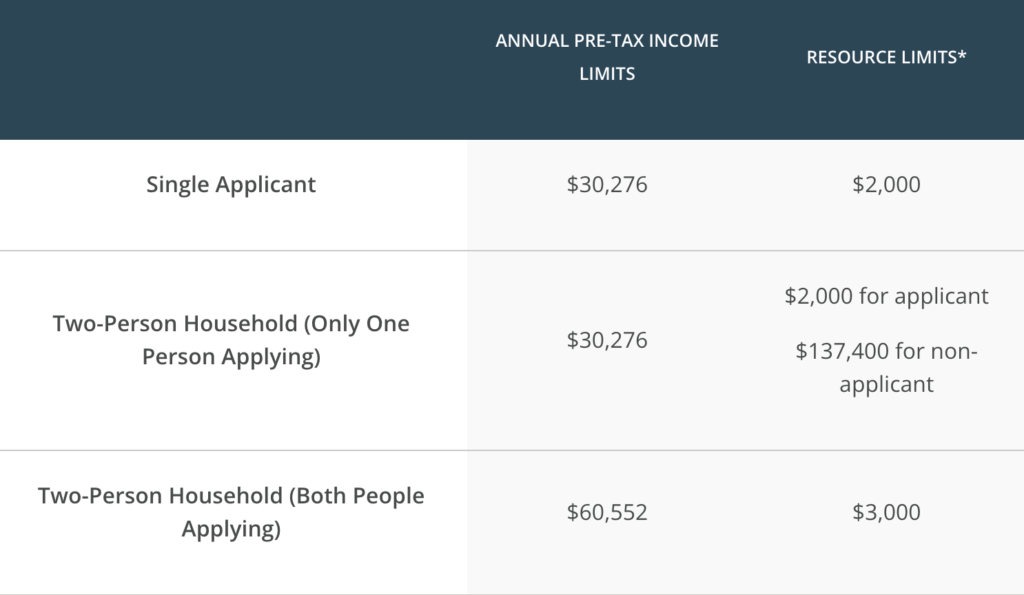
*There’s a 5-year look-back period that checks no assets were gifted or undersold in anticipation of a future Medicaid claim.
In addition to the financials, applicants must also prove their medical eligibility for Medicaid, often referred to as being clinically screened. This is typically conducted by the local Area Agency on Aging/Aging and Disability Resource Connection. The screening must show the applicant needs assistance with a minimum of three actions needed for daily living, such as:
- Bathing
- Dressing
- Eating
- Toileting
- Getting in or out of bed
- Walking without assistance
How to Apply for Medicaid in New Jersey
The easiest way to apply for Medicaid in New Jersey is to register with the NJ FamilyCare website and then follow the application process. Alternatively, seniors can download an application form from the NJ FamilyCare page of the Department of Human Services website and mail the completed form to NJ FamilyCare, P.O. Box 8367, Trenton, NJ 08650-9802. However, this method can increase the processing time considerably as the department may take 1-2 weeks just to follow up on the application. Seniors who prefer to speak to someone face-to-face may find it easier to contact their nearest County Board of Social Services, where an advisor can help initiate the application process.
Information You Will Need
- Social Security numbers (or document numbers for legal immigrants who need insurance)
- Employer and income information for everyone in the applicant’s household
- Policy numbers for current health insurances, including Medicare
- Information from job-related health insurances available to anyone in the applicant’s household
How To Get Help Applying for Medicaid
Seniors who need some assistance applying for Medicaid can get help from online and in-person resources. Those listed here can provide expert advice and also guide the senior step-by-step through the application process.
CONTACT
(888) 576-5529
LSNJLAW is a nonprofit operated by Legal Services of New Jersey that provides free legal assistance and advice to low-income seniors. Its website contains information about Medicaid and its online application form can connect seniors to legal advisors who can assist.
Online Only
The American Council on Aging is a nonprofit that provides a free online-only service for seniors who need assistance prior to applying for Medicaid. It provides comprehensive information about Medicaid in New Jersey, including content about waivers for seniors who don’t require assisted living but need Medicaid-funded health care. The site also includes a Medicaid eligibility test so potential applicants can determine if they qualify. It also has a spend-down calculator that can indicate how much of a senior’s assets must be spent down to become eligible for Medicaid.
Online Only
NJHelps is the State of New jersey’s online assistance site to help seniors determine if they’re eligible for one or more state assistance programs, including Medicaid. It then helps visitors begin the application process. The site also provides advice on other free aid services, such as the Supplemental Nutrition Assistance Program and Cash Assistance, which could be useful to seniors waiting for a decision on their Medicaid applications.
Does Medicare Cover Assisted Living in New Jersey?
The short answer is that no, Medicare does not cover the cost of assisted living in New Jersey. Assisted living facilities are considered to be a “residential setting” and not a “clinical setting,” (think nursing homes). While Medicare doesn’t cover the cost of care received in an assisted living community, it does still cover things like approved medications, doctor visits, medical equipment, etc., just like it would if you lived at home.
For more information about when Medicare can be used to pay for senior living in a nursing home, and for Medicare-related resources, see our guide to Nursing Homes in New Jersey.
Other Financial Assistance Options for Assisted Living in New Jersey
Seniors who are not eligible (due to location, financial situation, or other factors) for other types of financial assistance, do still have some options. See the table below for an overview of some of the most common ways to make Assisted Living affordable.
Aid and Attendance
Learn more and apply online at va.gov.
Veterans who receive a VA pension may also be eligible for the Aid and Attendance benefit, a monthly cash allowance that veterans receive in addition to their standard pension amount. The benefit is intended for veterans in need of long-term care services and may be used towards paying for Assisted Living.
Reverse Mortgages
Learn more about your options and how to apply at ftc.gov
If you own a home, you may be able to use a reverse mortgage to help pay for Assisted Living. Reverse mortgages are loans that one can take out against the value of their home, essentially converting some of the home’s equity into cash. Reverse mortgage loans do need to be repaid with interest, typically within 12 months of receiving the loan.
Long-Term Care (LTC) Insurance
Learn more about Long-Term Care Insurance and how to apply for a policy at acl.gov.
Seniors who already have long-term care insurance may be able to use it to pay for Assisted Living. Most policies cover at least a portion of the cost, but it depends on the specific policy terms. Note that older adults who are already in need of Assisted Living will not typically be eligible to sign up for a LTC insurance policy.
Free and Low-Cost Resources for Seniors in New Jersey
New Jersey is home to many nonprofits and government agencies dedicated to helping the state’s seniors live more comfortable lives. The resources listed here can help assisted living residents with complaints about their facilities, as well as provide in-home services for those not yet ready to move to an institutional care facility.
(877) 582-6995
The NJ Long-Term Care Ombudsman is an independent advocate for seniors living in residential care facilities throughout the state. Its ombudsmen are directly appointed by the state governor. Their duties include visiting facilities to speak in confidence with residents, inform them of their rights and investigate any complaints they have with their care providers. The ombudsman can negotiate solutions but not impose its recommendations. However, if a complaint suggests criminal behavior, such as elder abuse, the ombudsman will refer it to the appropriate law enforcement entity.
(877) 222-3737
Each of New jersey’s 21 counties has an Area Agency on Aging, which is responsible for organizing multiple resources in the locality that support seniors in community-based settings. Consequently, it’s often a good starting point for older citizens unsure of what’s available in their county. The agency is also the Aging and Disability Resource Connection for its area, which can inform seniors about the long-term services and supports available in their area.
(800) 792-8820
The State Health Insurance Assistance Program provides confidential advice and information to seniors who already benefit from Medicare and those who want help to enroll in a plan. Its advisors are unbiased and don’t receive a commission, so seniors needn’t be concerned about being sold private health care insurance. They can answer questions seniors have about Medicare and supplemental policies, better known as Medigap. They can also help seniors file their benefit claims and support those whose applications have been rejected.
NJ@cns.gov
AmeriCorps is an independent U.S. government agency that administers many programs at local, state and national levels, utilizing a vast network of volunteers that support their communities and therefore, the country as a whole. The Retired and Senior Volunteer Program, often shortened to RSVP, is one such program. Nonprofit organizations throughout New Jersey receive grants from AmeriCorps to administer RSVP in their communities. The grant enables them to connect volunteers with the organizations that need their help to fulfill their purposes. Volunteers work in many areas and, through RSVP, receive training, when necessary, and accident and liability insurance for the periods they do voluntary work.
211
211 New jersey is the state’s branch of a national organization. Within New Jersey, 211 can help residents locate and access agencies and nonprofits in their area dedicated to helping seniors within the community and in residential care. Whereas an Area Agency on Aging can directly help seniors by coordinating assistance from multiple state-sponsored agencies, 211 can refer them to nonprofits funded by donations and supported by volunteers who may offer help not provided by the state. 211 also has a 24-hour helpline, so seniors aren’t limited to when they contact the free service.
COVID-19 Rules for Assisted Living in New Jersey
The following information is based on research done on several government websites, including The New Jersey Department of Health. These rules apply to nursing homes and other types of senior living facilities. We’ve most recently updated this data on 3/10/2022, but since COVID-19 is a rapidly evolving pandemic, contact your local senior living facility or Area Agency on Aging for more specific and up-to-date information.
Visitation Policies
Are loved ones allowed to visit to provide emotional support?
Are relatives allowed to visit for end-of-life care?
Are residents required to quarantine after visiting with a loved one?
Are visitors required to wear PPE (including masks) in order to visit residents?
Are non-medical contractors (such as hairdressers and entertainers) allowed in senior living facilities?
Does the state recommend or require that senior living facilities assist families with setting up virtual visit alternatives?
Are visitors checked for elevated temperatures?
Are visitors required to answer questions about health, travel, and potential virus contact?
Outings & Social Activities
Are residents allowed to leave (errands, visiting family, etc.) for non-medical reasons?
Are residents who leave required to quarantine when they return?
Are senior living communities required to cancel all group outings?
Are residents allowed to eat meals together in a common area?
Are residents allowed to gather in common areas for group activites?
*Note: This information was not available for this state, contact your local area agency on aging or senior living facility for more information.
COVID-19 Safety Measures for Staff and Residents
Are staff members regularly required to do a temperature check?
Are staff members regularly tested for COVID-19?
Are staff members members regularly required to do a health and safety screening, including questions about travel, contact with positive cases, etc?
Are residents regularly screened for COVID-19 symptoms?
Are residents regularly checked for elevated temperatures?
Are residents regularly tested for COVID-19?
Assisted Living Laws and Regulations in New Jersey
The New Jersey Department of Health monitor’s the state’s assisted living facilities to establish their adherence to the regulations governing their license agreements. It’s authorized to conduct unannounced inspections, demand underperforming facilities make changes by stipulated dates and revoke licenses from those that don’t abide by the regulations.
Assisted Living Service Plan Requirements
The assisted living facility must conduct an initial health assessment on the senior’s day of admission to determine the level of care the new resident requires. If the assessment suggests health care needs, an assessment conducted by a registered professional nurse must be completed within 14 days of the resident’s initial admission.
Assisted Living Admission Requirements
New Jersey’s Department of Health doesn’t define requirements and restrictions for assisted living, other than the facility can’t retain a resident who needs specialized long-term care, such as that provided in a nursing home. Each facility determines its own discharge requirements, which could mean families having to reconsider long-term care if their loved one develops a condition that makes continued residence untenable, such as cognitive decline.
Assisted Living Scope of Care
Assisted living facilities must provide care 24 hours a day. This must satisfy each resident’s needs and include personal care, medication services, social work support, recreational activities and dining facilities. It must also be capable of providing care given in nursing homes.
Assisted Living Medicaid Policy
Every facility must distribute a statement of residents’ rights to seniors and disclose their Medicaid admissions policies to current and potential residents.
Assisted Living Facility Requirements
Facilities must provide at least 150 square feet of usable floor space in a resident’s private room and an additional 80 feet in a semiprivate room. No resident unit can house more than two people. Each unit must have a toilet, sink and bath or shower. It must also be fitted with smoke detection and fire suppression systems that also operate throughout the building.
Medication Management Regulations
Registered nurses can inject allowable medications, such as epinephrine and insulin. They can also delegate the task to certified nurse aides and staff who have completed a medication aide course approved by the Department of Health and passed the certified exam.
Staffing Requirements
Every facility must have an administrator, or substitute, always on-site if it has 60+ beds, or half the time if less than 60 beds. A registered nurse must be available 24/7 and a minimum of one personal care assistant and one staff member must be awake on-site continuously. New Jersey doesn’t impose minimum staff ratios but staffing must be sufficient to care for residents’ needs.
Staff Training Requirements
The administrator must be certified as an assisted living administrator in New jersey and receive 30 hours of relevant training every 3 years. The facility determines all initial and ongoing training for staff. Personal care assistants must pass an approved nurse aide training course and receive at least 20 hours of additional learning every 2 years. Staff who administer medication must complete another 10 hours’ training every 2 years.
Background Checks for Assisted Living
All staff must be certified or licensed. Certified/licensed individuals will have passed a fingerprint criminal background check. Certified nurse aides and personal care assistants must be on a state agency registry to be allowed to perform their roles.
Requirements for Reporting Abuse
All staff are legally mandated to report suspected abuse to the Department of Health, and, in some cases, law enforcement. Facilities must also submit reports within specific time frames, such as within 24 hours in cases of abuse and exploitation and 2 hours where there has been a serious bodily injury.


